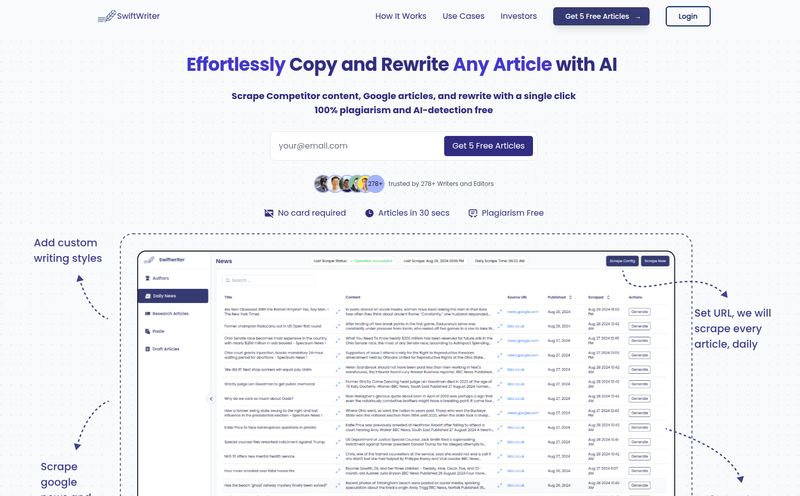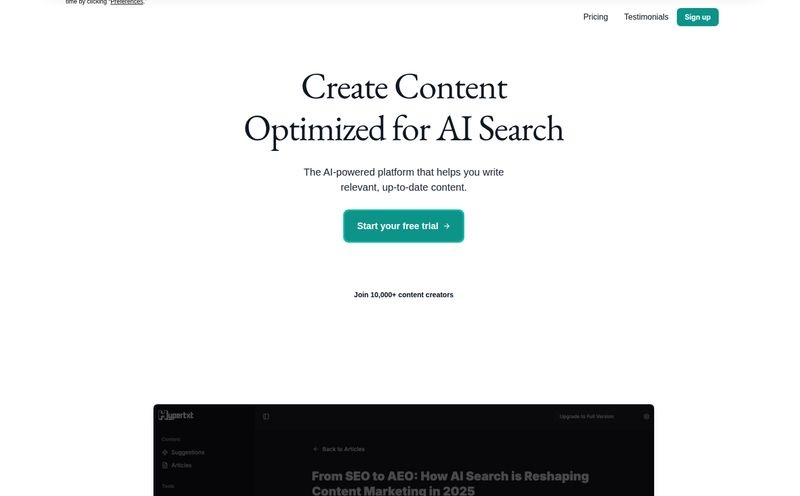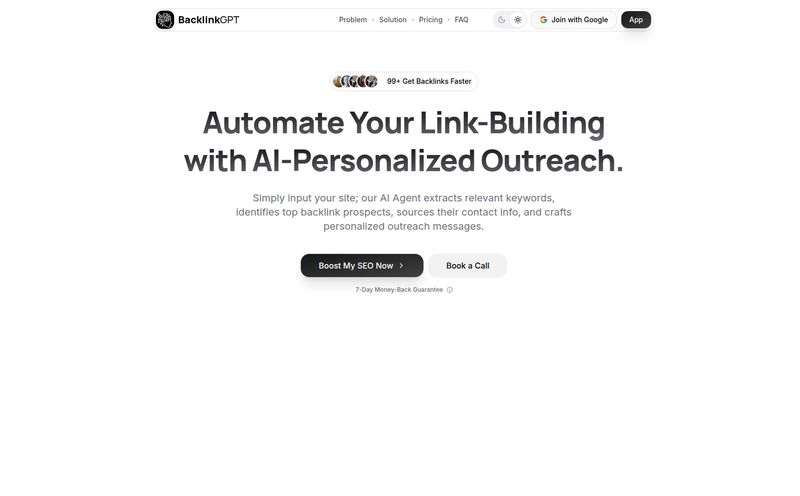The lifeblood of any plaintiff's firm is the steady flow of good, meritorious cases. But finding them? That’s the real grind. It’s a messy, often frustrating process of chasing leads, sifting through mountains of data, and relying on intake channels that can feel like panning for gold in a river of mud. You spend countless hours and a small fortune on marketing, only to get leads that go nowhere. It's the part of the job nobody really loves.
For years, we've just accepted this as the cost of doing business. But what if it didn't have to be? I've been keeping a close eye on the legal tech space, and every so often, a tool comes along that makes me sit up and pay attention. Today, that tool is Darrow.
Their website has this slick, minimalist vibe, and a banner that says, "Built for law. Not for likes." That kind of confidence gets my attention. They call themselves a "Justice Intelligence Platform," which sounds like something straight out of a sci-fi movie. But after looking into what they actually do, it starts to make a whole lot of sense.

Visit Darrow AI
So, What is Darrow, Really?
Forget the buzzwords for a moment. At its core, Darrow is like an AI-powered bloodhound for high-value legal claims. Instead of you manually searching for the next big case, Darrow's platform is out there 24/7, scanning the real world—news reports, consumer complaints, company filings, you name it—to proactively detect events that could lead to large-scale litigation. Think of it as moving from a reactive model (waiting for clients to call) to a proactive one (finding the problem before most people even know it's a legal issue).
It’s not just about finding a single disgruntled customer. Darrow’s AI is designed to connect the dots, to see the pattern in the noise. It aims to identify a harmful event, figure out how many people were affected, and even predict the potential legal and financial outcome. That’s a pretty bold claim.
How This AI Magic Actually Works
Darrow isn't just throwing spaghetti at the wall to see what sticks. The process is pretty methodical, breaking down into a few key stages.
Scanning the Digital Haystack for Legal Needles
First, the platform ingests a massive amount of public data. We're talking about a scale that a team of paralegals could never hope to match. It’s looking for those initial signals of wrongdoing or harm. A faulty product, a data breach that's bigger than initially reported, environmental violations… these are the kinds of events Darrow is built to sniff out. It’s the legal-tech equivalent of having investigators on a million different street corners at once.
From Data Points to Qualified Plaintiffs
Okay, so the AI finds a potential problem. Now what? This is where it gets interesting for plaintiff's attorneys. Darrow doesn't just hand you a news clipping. It works to determine the scope of the harm and identify the class of victims. The goal is to not just give you a case idea, but to help you with the next, crucial step: plaintiff acquisition. They help you find qualified, motivated plaintiffs, which can dramatically shorten the time it takes to get a case off the ground.
The Crystal Ball: Predicting Outcomes and Value
This is probably the most ambitious feature. Darrow’s AI attempts to predict the legislative outcome and put a financial value on a potential case. I’ve always been a bit skeptical of 'AI crystal balls,' but the logic here is sound. By analyzing historical case data and the specifics of the current event, the system can generate a data-driven assessment. It helps answer the big question before you invest hundreds of hours and resources: Is this case worth pursuing? It’s a tool for managing risk and focusing your firm’s firepower where it counts the most.
Let's Be Real: The Potential Downsides and Considerations
As exciting as this all sounds, I'm a professional skeptic. No platform is perfect, and it's important to go in with your eyes open. There are a few things to consider with a platform like Darrow.
First, there's the reliance on AI. An algorithm is only as good as its data and its programming. Law is filled with nuance, human factors, and unexpected turns that an AI might overlook. I don’t see this as a replacement for a lawyer's intuition and experience, but rather a powerful tool to augment it. You still need a human in the driver's seat to make the final call.
Second, let's talk about trust. Handing over part of your case discovery process to an AI requires a leap of faith. You have to trust its predictive capabilities and the quality of the leads it generates. This is a hurdle that any new legal tech, especially one this advanced, has to clear.
And of course, there’s the cost. While we'll get to that in a second, a sophisticated platform like this isn't going to be cheap. You have to weigh the investment against the potential return of landing one or two high-value cases you otherwise would have missed.
Okay, So What's the Price Tag?
This is the part where I have to give you the classic B2B answer: It depends. Darrow doesn't list their pricing publicly on their website. This is pretty standard for high-end, specialized platforms. The cost is likely customized based on the size of your firm, your practice areas, and the level of access you need. You'll have to contact them for a demo and a quote.
My take? Don't let that scare you off. Think of it less as a monthly software subscription and more as an investment in a strategic partner for case acquisition. The ROI could be massive if it delivers on its promises.
Who is Darrow Really Built For?
Based on their listed practice areas—things like Antitrust & Competition, Privacy & Data Breach, Environmental Law, and Consumer Regulation—it’s clear Darrow is targeting top-tier litigators and plaintiffs' firms that handle complex, often class-action-style, cases. If you're a solo practitioner handling slip-and-falls, this probably isn't the right fit. But if your firm is looking for the next big environmental tort or data privacy lawsuit, Darrow could be your new best friend.
Frequently Asked Questions About Darrow AI
- What exactly is Darrow?
- Darrow is an AI-powered platform that helps plaintiff's law firms discover high-value, meritorious cases. It scans public data to find harmful events, identifies potential victims, and assesses the financial value and legal merits of a case before you even start.
- How does Darrow find its cases?
- It uses artificial intelligence to analyze vast amounts of real-world data from various sources like news, consumer complaint forums, and regulatory filings to detect patterns of harm that could form the basis of a significant lawsuit.
- Is Darrow meant to replace researchers or paralegals?
- Not at all. It's best viewed as a force multiplier. It handles the massive, time-consuming data-sifting process, freeing up your human team to focus on strategy, client relations, and the nuanced legal work that only a person can do.
- What types of law does Darrow focus on?
- It specializes in complex litigation areas such as Antitrust, Privacy & Data Breach, Environmental Law, Consumer Regulation, Securities & Financial Fraud, and Medical Liability, among others.
- How much does Darrow cost?
- Pricing isn't publicly listed. It's a bespoke service, so you'll need to contact Darrow directly for a demonstration and a customized quote based on your firm's needs.
- Can you really trust an AI's legal predictions?
- The predictions are data-driven assessments, not guarantees. They are powerful tools for risk assessment and focusing resources, but they should always be used in conjunction with an experienced attorney's judgment and expertise.
The Verdict: Is Darrow the Future of Litigation?
Look, the legal world is often slow to adopt new tech. We like our precedents and our proven methods. But the world is changing, and the sheer volume of data is becoming impossible for humans to manage alone. Tools like Darrow represent a fundamental shift in how law firms can operate.
It's a move from reactive to proactive, from manual grind to intelligent automation. While it's important to remain critical and understand its limitations, ignoring this kind of innovation feels like insisting on using a horse and buggy when a sports car just pulled up. Darrow isn't just a fancy search engine; it’s a strategic intelligence tool that could very well find your firm's next landmark case. And for any ambitious litigator, thats a very exciting prospect indeed.



